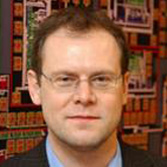
Eugenio Culurciello
"Visual Intelligence and the Terminator"
Fowler Hall: 4:30 - 5 PM
What would it take to replicate the human visual system in synthetic hardware? What software models can we use to implement the mammalian visual system? The goal of our research is a neuromorphic vision system capable of categorizing, tracking and maintaining a visual memory of tens of targets. The application of such system is in smart phones, computers, robotics, autonomous cars, smart appliances, to name a few.
Bio: Eugenio Culurciello (S'97-M'99) received the Ph.D. degree in Electrical and Computer Engineering in 2004 from the Johns Hopkins University, Baltimore, MD. He is an associate professor of the Weldon School of Biomedical Engineering and an Associate Professor of Psychological Sciences in the College of Health & Human Sciences at Purdue University, where he directs the ‘e-Lab’ laboratory. His research focus is in artificial vision systems, deep learning, hardware acceleration of vision algorithms. His research interests include: analog and mixed-mode integrated circuits for biomedical instrumentation, synthetic vision, bio-inspired sensory systems and networks, biological sensors, silicon-on-insulator design. Eugenio Culurciello is the recipient of The Presidential Early Career Award for Scientists and Engineers (PECASE), the Distinguished Lecturer of the IEEE (CASS), and is the author of the book "Silicon-on-Sapphire Circuits and Systems, Sensor and Biosensor interfaces" published by McGraw Hill in 2009, and "Biomedical Circuits and System, Integrated Instrumentation" published by Lulu in 2013. In 2013 Dr. Culurciello founded TeraDeep http://teradeep.com/, a company focused on the design of mobile co-processors and neural network hardware for understanding images and videos. https://engineering.purdue.edu/elab/
